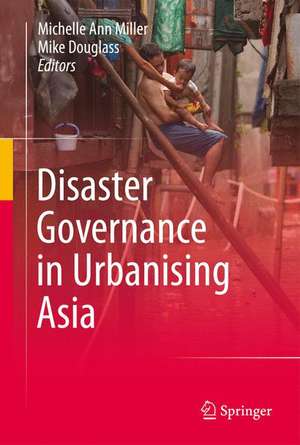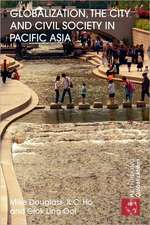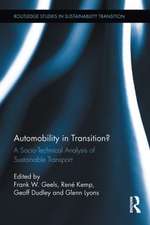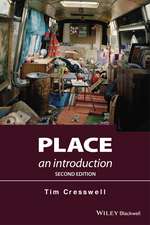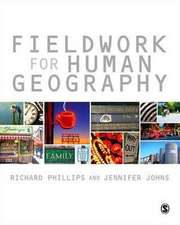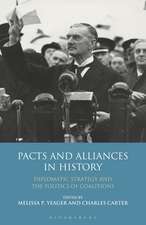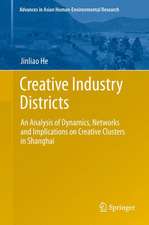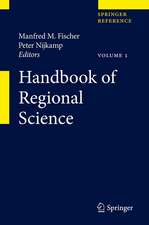Disaster Governance in Urbanising Asia
Editat de Michelle Ann Miller, Mike Douglassen Limba Engleză Hardback – 15 dec 2015
| Toate formatele și edițiile | Preț | Express |
|---|---|---|
| Paperback (1) | 388.90 lei 6-8 săpt. | |
| Springer Nature Singapore – 8 noi 2017 | 388.90 lei 6-8 săpt. | |
| Hardback (1) | 396.24 lei 6-8 săpt. | |
| Springer Nature Singapore – 15 dec 2015 | 396.24 lei 6-8 săpt. |
Preț: 396.24 lei
Nou
Puncte Express: 594
Preț estimativ în valută:
75.84€ • 78.16$ • 64.03£
75.84€ • 78.16$ • 64.03£
Carte tipărită la comandă
Livrare economică 01-15 martie
Preluare comenzi: 021 569.72.76
Specificații
ISBN-13: 9789812876485
ISBN-10: 9812876480
Pagini: 180
Ilustrații: XIII, 291 p. 31 illus.
Dimensiuni: 155 x 235 x 25 mm
Greutate: 0.61 kg
Ediția:1st ed. 2016
Editura: Springer Nature Singapore
Colecția Springer
Locul publicării:Singapore, Singapore
ISBN-10: 9812876480
Pagini: 180
Ilustrații: XIII, 291 p. 31 illus.
Dimensiuni: 155 x 235 x 25 mm
Greutate: 0.61 kg
Ediția:1st ed. 2016
Editura: Springer Nature Singapore
Colecția Springer
Locul publicării:Singapore, Singapore
Public țintă
ResearchCuprins
Chapter 1: Disaster Governance in an Urbanising World Region.- Chapter 2: The Urban Transition of Disaster Governance in Asia.- Chapter 3: Building Cities in a Subduction Zone: Some Indonesian Dangers.- Chapter 4: Muddy Resistance: Community Empowerment in Mudflow Disaster Governance in Porong, Sidoarjo, Indonesia.- Chapter 5: Disaster Governance in War-Torn Societies: Tsunami Recovery in Urbanising Aceh and Sri Lanka.- Chapter 6: Disaster Governance in Small Urban Places: Issues, Trends, and Concerns.- Chapter 7: “Good” Time For Disaster: The Importance of Temporality in Governance Thinking.- Chapter 8: Intergenerational Transmission of Local Knowledge towards River Flooding Risk Reduction and Adaptation: The Experience of Dagupan City, Philippines.- Chapter 9: Securing the Safety of Informal Settler Families along Waterways in Metro Manila, Philippines: A Government-Civil Society Organisation Partnership.- Chapter 10: Bangkok and the Floods of 2011: Urban Governance and the Struggle for Democratisation.- Chapter 11: Is it Possible to Integrate Disaster Governance into Urbanisation - Evidence from Chinese Townships Hit by 2008 Wenchuan Earthquake and 2013 Lushan Earthquake.- Chapter 12: Post-Disaster Reconstruction Models: The Governance of Urban Disasters in China, Iran and Myanmar.- Chapter 13: Nuclear Risk Governance in Japan and the Fukushima Triple Disaster: Lessons Unlearned.
Notă biografică
Michelle Ann Miller is a Senior Research Fellow in the Asian Urbanisms Cluster at the Asia Research Institute, National University of Singapore. She previously taught in the Masters of International and Community Development program at Deakin University and on subjects related to participatory approaches to development at Charles Darwin University. Dr Miller’s research is geographically centered on Southeast Asia, especially Indonesia and investigates the governance of environmental disasters and human conflicts. She has authored, edited or co-edited a number of books including: Rebellion and Reform in Indonesia: Jakarta’s Security and Autonomy Policies in Aceh (Routledge, 2009); Autonomy and Armed Separatism in South and Southeast Asia (ISEAS, 2012); Ethnic and Racial Minorities in Asia: Inclusion or Exclusion (Routledge, 2012); and (with Tim Bunnell) Asian Cities in an Era of Decentralisation (Routledge, 2014).
Mike Douglass is Professor and Leader of the Asian Urbanisms Cluster at the Asia Research Institute and Professor at the Lee Kuan Yew School of Public Policy at the National University of Singapore, where he teaches and does research on cities, disaster governance and globalization in Asia. He was previously professor and chair of the Department of Urban and Regional Planning and Director of the Globalization Research Center at the University of Hawaii. He received his Ph.D. in Urban Planning from UCLA. He previously taught at the Institute of Social Studies (Netherlands) and at the School of Development Studies, University of East Anglia (U.K.). He has also been a Visiting Scholar/Professor at Thammasat University, Tokyo University, Stanford University, UCLA, and the Korean Research Institute for Human Settlements. Recent books include: Globalization, the Rise of Civil Society and Civic Spaces in Pacific Asia Cities; Connected Cities: Histories, Hinterlands, Hierarchies and Networks; and Building Urban Communities: The Politics of Civic Space in Asia.
Mike Douglass is Professor and Leader of the Asian Urbanisms Cluster at the Asia Research Institute and Professor at the Lee Kuan Yew School of Public Policy at the National University of Singapore, where he teaches and does research on cities, disaster governance and globalization in Asia. He was previously professor and chair of the Department of Urban and Regional Planning and Director of the Globalization Research Center at the University of Hawaii. He received his Ph.D. in Urban Planning from UCLA. He previously taught at the Institute of Social Studies (Netherlands) and at the School of Development Studies, University of East Anglia (U.K.). He has also been a Visiting Scholar/Professor at Thammasat University, Tokyo University, Stanford University, UCLA, and the Korean Research Institute for Human Settlements. Recent books include: Globalization, the Rise of Civil Society and Civic Spaces in Pacific Asia Cities; Connected Cities: Histories, Hinterlands, Hierarchies and Networks; and Building Urban Communities: The Politics of Civic Space in Asia.
Textul de pe ultima copertă
This edited book approaches the threat and impact of environmental disasters on Asia’s urban populations from a governance perspective. It adopts a multi-sector and multi-disciplinary approach to disaster governance that emphasises the importance of multiple stakeholders in preparing for, responding to and recovering from disasters and their cascading impacts in Asia’s cities. The contributors to this volume take a broad view of the multifaceted causalities and the interconnected threats and vulnerabilities of environmental disasters in urbanising Asia. As such, the book is an invitation to advance scholarship in the search for more effective, comprehensive and inclusive disaster preparedness agendas, recovery programs and development priorities.
Caracteristici
Presents inclusive approaches to disaster governance in urbanizing Asia
Departs from dominant public administration orientation of disaster studies while emphasizing multidisciplinary approaches and multiple stakeholders
Highlights particular challenges and opportunities of disaster events for urban populations within and beyond Asia
Departs from dominant public administration orientation of disaster studies while emphasizing multidisciplinary approaches and multiple stakeholders
Highlights particular challenges and opportunities of disaster events for urban populations within and beyond Asia
